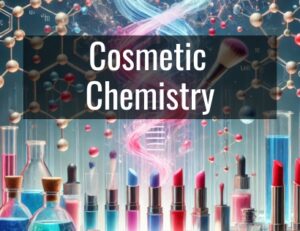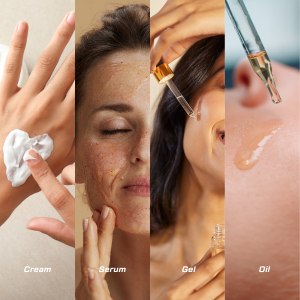Cosmetic Chemistry: What Estheticians Need to Know

In the world of beauty and skincare, estheticians play a critical role in helping individuals achieve radiant and healthy skin. But behind every skincare treatment or beauty product lies a wealth of science- cosmetic chemistry. Understanding this science is not just an advantage but a necessity for estheticians who want to excel in their careers and offer the best possible solutions to their clients.
What is Cosmetic Chemistry?
Cosmetic chemistry is the branch of science that focuses on the formulation and creation of skincare, hair care, and makeup products. It involves understanding the properties of different ingredients and how they interact with the skin. For estheticians, a basic knowledge of cosmetic chemistry is essential because it allows them to select the best products for their clients’ skin types and concerns, ensuring safe and effective results.
The Role of an Esthetician in Cosmetology
Estheticians are licensed skin care professionals who specialize in beautifying the skin. They perform a variety of services including facials, chemical peels, microdermabrasion, and waxing. Estheticians are not medical professionals, but their work overlaps with health, particularly when it comes to addressing issues like acne, aging, and hyperpigmentation.
To provide these services effectively, estheticians must have a solid understanding of the products they use, and that’s where cosmetic chemistry comes in. They need to know which ingredients are beneficial, how they work, and any potential side effects or contraindications.
Importance of Cosmetic Chemistry for Estheticians
- Ingredient Knowledge: Every skincare product contains active and inactive ingredients. Active ingredients directly affect the skin by providing benefits such as hydration, anti-aging properties, or acne reduction. Inactive ingredients, on the other hand, may provide texture, scent, or stability to the product. An esthetician with a deep understanding of these ingredients can make more informed choices about which products to use on their clients. For example, they would know that retinoids are effective for anti-aging but can be too harsh for sensitive skin types, or that salicylic acid is great for acne-prone skin due to its ability to penetrate and clear out pores.
- Customized Skincare Solutions: Cosmetic chemistry enables estheticians to tailor their treatments to individual clients. For example, if a client has dry skin, an esthetician might opt for products rich in humectants like glycerin or hyaluronic acid to attract moisture to the skin. Alternatively, for clients with oily or acne-prone skin, products with salicylic acid or benzoyl peroxide might be more appropriate.
- Safety and Compliance: Product safety is paramount in skincare, and cosmetic chemists are responsible for ensuring that products are safe for consumer use. Estheticians who understand the basics of cosmetic chemistry can ensure they are using products that are safe and suitable for their clients. For instance, they can avoid products that may cause allergic reactions or irritation for sensitive clients. Additionally, understanding proper ingredient concentrations is important, as some active ingredients can be harmful in high doses.
- Effectiveness of Treatments: Knowing how ingredients work on a chemical level allows estheticians to maximize the effectiveness of their treatments. For example, certain ingredients, like Vitamin C, are unstable and degrade quickly when exposed to air or light. Estheticians who are aware of this can select products that use stabilized forms of Vitamin C to ensure their clients are getting the full benefits of the ingredient.
- Keeping Up with Trends: The beauty industry is constantly evolving, with new ingredients and products being introduced regularly. By staying informed about cosmetic chemistry, estheticians can remain current with the latest trends and offer cutting-edge treatments to their clients. For example, recent trends like the use of probiotics in skincare or the rise of “clean beauty” products require an understanding of the science behind these innovations to assess their effectiveness.
Key Ingredients in Cosmetic Chemistry

For estheticians, being familiar with the most commonly used ingredients in skincare products is essential. Here are a few key ingredients and their benefits:
- Hyaluronic Acid: A powerful humectant that attracts and retains moisture in the skin, making it ideal for dry and dehydrated skin types.
- Retinoids: A form of Vitamin A that promotes cell turnover and is highly effective in treating aging skin and acne.
- Alpha Hydroxy Acids (AHAs): These exfoliants help remove dead skin cells, improve skin texture, and promote the growth of new skin cells.
- Salicylic Acid: A beta-hydroxy acid (BHA) that penetrates the pores and helps treat acne by exfoliating and reducing inflammation.
- Peptides: Small chains of amino acids that help stimulate collagen production and improve skin elasticity.
- Antioxidants: Ingredients like Vitamin C and E that help protect the skin from damage caused by free radicals and environmental stressors.
Understanding Product Formulations

Product formulation is the art and science of combining different ingredients to create an effective product. Formulators take into account not only the active ingredients but also the delivery system, pH balance, and texture to ensure that the product is both effective and pleasant to use.
Types of Product Formulations
- Creams and Lotions: These are emulsions of water and oil, often stabilized with emulsifiers to ensure that the product remains homogeneous. Creams are typically heavier and more moisturizing, while lotions are lighter and more easily absorbed.
- Serums: These are lightweight formulations that contain a higher concentration of active ingredients. Serums are designed to penetrate deeper into the skin than creams or lotions.
- Gels: Gel formulations are often used for oilier skin types as they are water-based and non-greasy. They provide hydration without leaving a heavy residue on the skin.
- Oils: Oils are beneficial for dry skin types as they help lock in moisture and provide a protective barrier.
The Science of Skin and Cosmetic Chemistry

Understanding how the skin functions is essential for estheticians. The skin is the body’s largest organ and is composed of three primary layers: the epidermis, dermis, and subcutaneous tissue. Each of these layers has specific functions, and skincare products must penetrate these layers to be effective.
- Epidermis: The outermost layer that provides a barrier against environmental damage and pathogens.
- Dermis: The middle layer that contains collagen and elastin, responsible for the skin’s strength and elasticity.
- Subcutaneous Tissue: The innermost layer that provides insulation and stores energy.
Products like moisturizers and serums primarily work on the epidermis, but certain treatments and ingredients, like retinoids and peptides, can reach deeper into the dermis to promote long-term skin health.
The Importance of Cosmetology for Estheticians

Cosmetology is a broad field that encompasses various beauty treatments and therapies, including skincare, haircare, and makeup. For estheticians, the focus is largely on skincare, but the principles of cosmetology are vital to their practice. Understanding cosmetology helps estheticians offer comprehensive beauty solutions to their clients, combining knowledge of skin science with aesthetic treatments.
Enhancing Client Confidence
Estheticians who are well-versed in cosmetology can provide personalized care that addresses specific client concerns. Whether it’s treating acne, reducing signs of aging, or simply enhancing the natural beauty of the skin, cosmetology plays a key role in boosting client confidence.
Staying Ahead in the Beauty Industry
The beauty industry is highly competitive, and staying informed about the latest advances in cosmetology is essential for success. This includes understanding new ingredients, product formulations, and treatment methods. Estheticians who are knowledgeable in cosmetic chemistry and cosmetology are better positioned to offer cutting-edge services that meet client expectations.
Nuvida Health nagement Clinic: Elevating Skincare Standards
For estheticians and clients alike, access to high-quality skincare treatments is crucial. One clinic that stands out in the field of skincare and health management is Nuvida Health Management Clinic, Located in Colaba, Nuvida offers a wide range of health and wellness services, including advanced skincare treatments.
At Nuvida, the focus is not only on treating skin concerns but also on promoting overall health and well-being. Their team of experts is trained in the latest cosmetic and medical advancements, ensuring that clients receive the best care possible. Whether it’s non-invasive anti-aging treatments, acne management, or skin rejuvenation therapies, Nuvida’s approach is rooted in science, safety, and client satisfaction.
For estheticians, clinics like Nuvida serve as a model for how cosmetic chemistry and cosmetology can be integrated into everyday practice. By combining the science of skincare with a holistic approach to health, Nuvida is setting a new standard for skincare management in the beauty industry.
Cosmetic chemistry is an essential area of knowledge for estheticians who want to excel in their field. By understanding the science behind the products they use, estheticians can offer more effective, safe, and personalized treatments to their clients. From knowing key ingredients to understanding product formulations, cosmetic chemistry helps estheticians deliver results that not only enhance beauty but also improve skin health.
For those looking to take their skincare services to the next level, partnering with clinics like Nuvida Health Management Clinic can offer advanced solutions that combine the best of cosmetic science and holistic care. As the beauty industry continues to evolve, estheticians who stay informed about cosmetic chemistry and cosmetology will be well-positioned to meet the demands of their clients and succeed in their careers.
Lorem ipsum dolor sit amet, consectetur adipiscing elit. Ut elit tellus, luctus nec ullamcorper mattis, pulvinar dapibus leo.



Leave A Comment